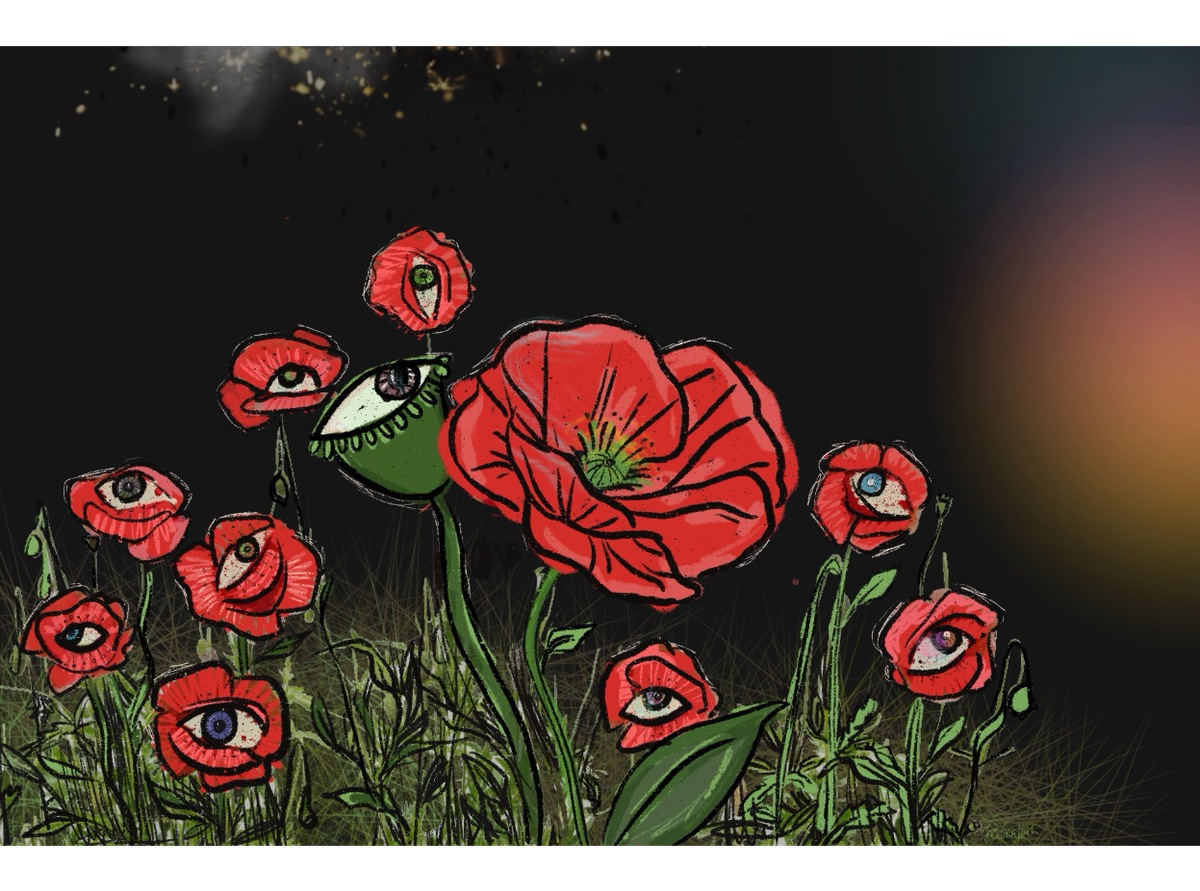
On the Past, Future, and the Singularity of Belonging
By Deema K. Shehabi
Illustration by Jess Rizkallah
“All the poplars and my ancestor’s solemn orchard
Were, I swear, smiling at me with Arab affection.”
~Layla ‘Allush
(translated by Abdelwahab Elmessiri)
Twelve months after Israel began its annihilation campaign of Palestinians in Gaza, the steadfast, larger-than-life journalist, Bisan Owda, asks the soul question of the year—who are the caretakers of Palestinian earth? As she pans her camera out, she points to the Mediterranean Sea and the palm trees dotting a refugee camp in Khan Younis, where Palestinian children move their bodies along a breezy lilt in their teacher’s voice. The teacher calls, they respond, she calls again—children respond in the long Palestinian breath we call home. The children, like the roving protagonist in Layla ‘Allush’s poem, reflect a childhood quintessence— namely, the freedom to give and receive joy. For a moment, the genocide collapses as they raise their autonomous voices to sing, and the land, momentarily languorous, expands with their song. This phenomenological moment captured by Bisan is also sacramental because it harkens back to a past (and subsequent future) where Palestinian children lived (and will live) in the luxuriance of childhood.
When these unfiltered images echo and ricochet across the planet, I recognize in them a visual periphery of my reason for being. This past year, I reconstructed memories of my childhood, imagining them to be small, linked gardens or little Edens extending into adulthood, where I could take my fill of love despite the daily brokenness. A few months ago, I saw a photograph of our family home in Gaza, and it was still standing. I ran my eyes over the lone, sunburnt cypress tree, the grapevine, and the terrace decorated with orange-black tulip tiles. Every inch of it is a repository of belonging. What’s a house but an extension of the collective body? What’s a body but an extension of God?
It's human (though privileged) to feel despair, especially when images of massacred babies, children, fathers, mothers, grandfathers, and grandmothers come at us incessantly, especially when we witness entire generations of Palestinian bloodlines being erased, especially when bunker busters rip the earth, killing indiscriminately and causing craters the size of little villages. The violence of colonialism seeks to recalibrate our existence and break our longstanding, centuries-old relationships with places and lands to which we belong. Capitalism tells us that it doesn’t matter who you are as long as you accrue capital. It doesn’t even matter if the property you own is ancestral; the only thing that matters is ownership (often theft) instead of belonging.
Everywhere we look, we are assaulted by values forced on us by Western necro politics though we see past their perfunctory hypocrisies. Muslim feminist scholar Fatima Mernissi says that Western societies dominate with a narrowly constructed definition of time, which consists of seemingly innocuous evaluations, inventories, and measurements. The colonialist obsession with inventory symbolizes ultimate control—the more you know about a people, the more control you exert over them. Mernissi even refers to this construction of time as an insidious kind of imperialism. For the West, time ushers in ‘progress’, a euphemism for wealth accrual, while simultaneously marching those it colonizes (including the earth) toward death.
As Israel increases its aggression against Lebanon, a displaced Lebanese woman remarks that the Israelis bombing Beirut, “may be masters of the sky, but we are masters of the earth.” When the oppressed remind those drunk with power and avarice where real power resides, a certain continuum of time (and its system of oppression) collapses into the ether.
Even though time dominates, I argue that we are living in a time of preternatural changes. A new paradigm of time can be born because death machines are not sustainable, because there’s an intergenerational shift in thinking about war and genocide, and because youth have a profound disagreement with their elders about the degraded environment. And if we listen to the land reflecting the voices of our children, we’ll know the answer to Bisan’s essential question, who are the caretakers of Palestinian earth? Yes, they’re the ones smiling at us with affection.
***
Deema K. Shehabi is a Palestinian poet.
Jess Rizkallah is a Lebanese writer and visual artist. Her book the magic my body becomes won the Etel Adnan Poetry Prize. Free Palestine.
Illustrator note: The earth is witness both to current events and toward the future/those who honor the earth. I illustrated this idea through the poppies, half turned toward the current and half turned toward a glow emanating from the future/horizon. Was thinking about how these poppies have endured and witnessed so much since antiquity and continue to grow through, and after, and into the future.